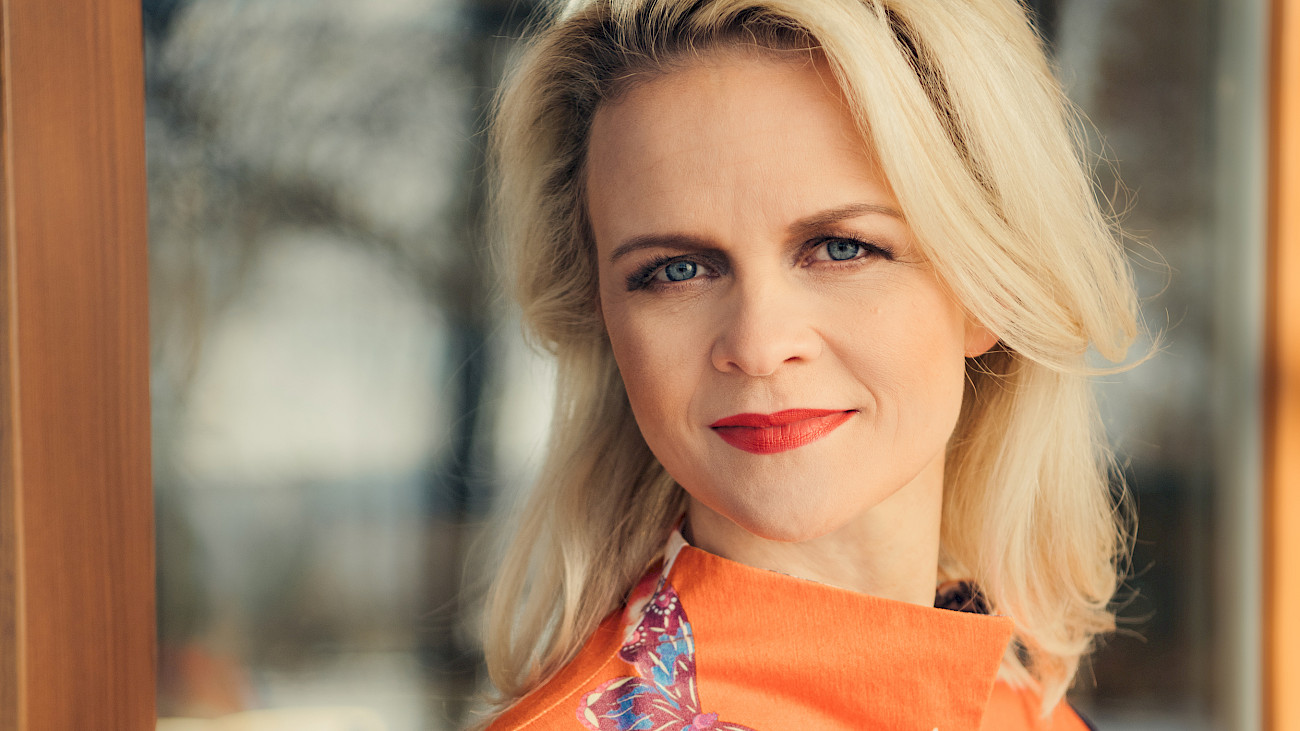
Iveta Apkalna
Organ / *1976 Rēzekne
Latvian Iveta Apkalna is Titular Organist at Hamburg's Elbphilharmonie – and a highly imaginative performer. As a Focus Artist (Fokus-Künstler) during the 2023/24 season, she will be exploring the possibilities of the organ at the Tonhalle Zürich in a wide variety of programmes.
Who is she? Discover her in the following questionnaire! It is based on the legendary templates created by Marcel Proust and Max Frisch. These combine important and supposedly unimportant questions in a playful way, thus providing insights into the interviewee’s personality. We have supplemented a selection of Proust’s and Frisch’s questions with inquiries about music.
Where would you like to live?
Where the sun shines. Yes, sunshine, that’s the most important thing. I love the sun.
Which mistakes would you be most likely to excuse?
Oh, that always depends on the situation, of course. I think I can forgive a great deal. I have actually had to forgive many things in my life. That was relatively easy. One thing I can’t really forgive is unfairness. It has annoyed me since childhood – not only in things that happen to me, but also when I see it happening anywhere. I can’t forgive that.
Who are your favourite fictional heroes?
Actually, I was never a huge fan of anything or anyone, not even in my childhood or youth. For me, the real heroes are the ones who quietly and unobtrusively make a difference – also in literature. I like novels in which you read about plain and ordinary people, like the ones you meet every day. For me, true heroes and heroines are those who don’t present it that way. Those are the kind of books that touch me the most. That reminds me, yes, I can name one hero: «A Man Called Ove» by Fredrik Backman. The story was also made into a film. After reading that novel by Backman, I read all his books. All of them are about people who in my opinion are true heroes.
Who is your favourite historical figure?
Well, I was compared to Joan of Arc in my younger years as an organist. Unfortunately, that was written really frequently in those first interviews almost 20 years ago, because I was a bit of the black sheep of my guild. I didn’t know anything about it, and I didn’t know this guild, I just made music the way I felt it. I just wanted to make music and reach people – and suddenly there was this Joan of Arc comparison. For me, however, this theme is mainly connected with Latvian history, because even as a small country, we nonetheless have many heroes and heroines. That’s what I have seen in our recent history, especially around the time when Latvia regained its independence on 4 May 1990. For me, it is these figures, these important personalities of the country, and there were several of them. I cannot name one specific individual. Thanks to these people, I can talk to you now. It may sound strange, but thanks to them I can do what I’m passionate about and love today.
Who is your favourite designer/artist?
If we consider music: I am totally enthusiastic about Martha Argerich. I admire this woman. I said earlier that I had few idols and was not really a fan of anyone – except perhaps Michael Jackson, whose music I could listen to for hours as a child. But for me, Martha Argerich is a woman with secrets, and that’s what makes her so interesting. Not only in the musical sense. It’s never the same for me, even when I listen to recordings of hers that I already know. I really always hear something new in the process.
And I love everything that Christian Dior created. I was at a Dior exhibition in Paris a few years ago. I’ve never owned a piece of his clothing and never will, but I was at the exhibition, and I thought: this is true art. I was really like a toddler. I was even there with my mother. And at that moment, she saw me being such a little girl again – with great big eyes that opened even wider with each successive room.
What is your most important character trait?
I am very disciplined. Sometimes I think that might bother other people, but honestly, I couldn’t do even half of what I have to do without that discipline – especially when you’re on the road so much. I have to thank my mum for showing me how to do it. She was also very disciplined. And both my grandmothers, who were teachers, also passed this mentality on to me. I have had this discipline since childhood – and have it to this day. It helps me to keep order in my mind. For example, I can’t start practising if something around me is out of order or distracting – whether it’s my own space, a hotel room or the concert hall. That may sound crazy, but for me that discipline is really important.
What is your favourite flower?
My favourite flower is lavender. My friends and family know that: when I die, please plant lavender all around where I lie.
Which natural gift would you like to possess?
There are many, of course. I especially wish that I could enjoy the moment fully, naturally and more deeply. I kind of already do that, but I’m always thinking. And because of my discipline, I’m always two or three steps ahead and not fully in the moment. That’s not so pleasant. You don’t always let go of your thoughts. That’s what I wish for: to really live in the here and now, and to savour it. By the way, I do that completely when I’m on stage. When I give a concert and play, I am only in that moment, and I enjoy that. But I would also like to be able to do that in life.
Would you like to have absolute memory?
The first thing you want to say is: yes! There are so many things you want to remember. For example, when you visit an exhibition or read a book that has a lot of historical facts in it. I already forget quite a lot. But on the other hand, I say: no. I wouldn’t like to have an absolute ear either. As an organist, it’s horrific, because every organ is tuned differently – and that hurts. I think having an absolute memory would destroy the desire to enjoy and be in the moment – referring back to your previous question. I know a few people who seem to have absolute memory. And then I ask myself: how much do they have to carry around with them? Besides, I have to say that what we organists have to do and bear in mind while we’re playing is quite remarkable. I think we have a different brain, in a way. If you were to do research, you would certainly see that part of our brain is different. We can do this super-multitasking that usually only young mothers learn because they have to. That’s why it was easy for me when I became a mother. So, holding the child in my arms at the same time as practising a fugue by J.S. Bach and singing a lullaby for my child – that was easy. I’m actually grateful to my instrument.
How old would you like to become?
Oh, I would like to have a very long life. I know it’s not easy when you’ve really been given this gift from God to stay on this earth as long as possible. But still, I think that the quality of life that you have when you’re over 90 is something to look forward to now. But of course, that’s hard to imagine. I say that because in my family all the women on my mother’s side have had very long lives. My great-grandmother died a week before her 100th birthday. And her daughter is now also 95 years old. I’m really looking forward to talking to these ladies. I think it’s nicer to take time to say goodbye to this life on earth.
Do you like travelling?
Yes, very much so. Although I have to say that the most beautiful journey for me is when I come home and know that I can be there for five days. Because as a musician, I travel so much. But I like to travel with my family, my children and my husband. That is of course something completely different.
What do you do when you travel?
I can’t say that we are very sporty as a family. We’re more nature lovers. For example, we like to go on bike tours when we’re in Italy or take very long walks when we’re by the sea. I am not a person who likes to go camping. No, I need comfort. After the bike tours and walks, I need a cosy little bed and want to lie in a warm bath. But what I do like to do on holiday is to switch off completely and be unavailable. I then concentrate completely on the four of us. And at such times, I also like to read a lot, because that’s what I miss in everyday life. I’m always far too tired and fall asleep immediately while reading. You can do that wonderfully on holiday, whether you’re taking a break while walking, lying by the pool or ensconced in a lovely holiday flat. Switching off in peace, reading, taking a little exercise and being with my children – that’s what matters to me.
Let’s talk about music. Do you like practising?
Yes, I do, actually. And I wish the day had more than 24 hours, because I want to practise in peace. Thanks to my discipline, I’m actually very well organised, but I really have a very large repertoire. But I would also like to practise what I don’t have to rehearse for a concert, simply because I feel like it – right now. But I have absolutely no time for that. I haven’t done it in a decade.
Which is your key classical work?
I think this is my calling card: the «Toccata» by the Latvian composer Aivars Kalējs, which is based on the chorale «Allein Gott in der Höh’ sei Ehr.» It’s really a work that at some stage everyone expects me to play, as an encore at the latest. For example, I wanted – and was allowed – to play it as the first piece at the inauguration of the Elbphilharmonie organ. And I think I’ll also play it as an encore in Zurich. Yes, I always enjoy playing it. Especially because it was written by a Latvian composer and organist who is also a friend and colleague of mine.
How would you describe your instrument?
It is indeed a «king» rather than a «queen.» A «king» who knows what he is capable of, but who is also permitted – and able – to test those of us who come to him. He gives us all the options, but also considers how far we have progressed and whether we are actually ready for a «dinner with His Majesty.» That may sound detached, but my instrument is really incredibly varied and challenging, so you always have to be very well prepared. The organ has many surprises in store, because it is ultimately a very big machine. So, from a technical point of view alone, the instrument is very royally equipped – also in terms of price, of course. For me, the organ reveals an inviting world that challenges us, but at the same time also embraces us if we find the right way. I have a great respect for the organ because there is no such thing as «my» organ – except the one I practise on at home. That’s the difference between an organist and a violinist, for example, who can travel with a specific violin. As an organist, you have to engage with an instrument again and again, as if you were visiting another person. Every time, you have to look into the soul of the other person and get along with them – and it isn’t always easy to get along with everyone. The organ is an instrument that gives a great deal, but we have to give back just as much. Like partners, you have to function together, and both sides have to respect, love, challenge and encourage one another.
How important is applause to you?
Very important, because that’s when I feel an exchange of energy. Applause at the beginning is important to greet each other, and also to get a sense of the interest and curiosity in the concert hall. At the end, it is important that we all celebrate this moment together – that is, the audience, the organ and I. I also give the instrument a round of applause. Because in my opinion, the concert is not only played by the performer, but also by the instrument and the audience. For me, how the audience listens and behaves during the concert is also music – but a kind of music that cannot be captured in the score. Tension and relaxation are important because that’s how the audience can celebrate itself at the end. Applause shows that we’ve achieved something together.
Do you have a pre-concert ritual?
I think all musicians have that. I always need a moment when the green light has been given for me to go on stage. Then I usually need another two minutes or so in complete silence and stillness backstage, where I go deep inside myself and pray. And I always have a lucky charm with me that I put on the console. It’s a dark red bag with three things in it: a rosary that I received as a present from John Paul II, a stone painted by my son, and a ring that was handmade by my daughter. These things are always with me.
What do you appreciate about conductors or performers?
As far as conductors are concerned, I’m always grateful that they perform with an organ at all. For many conductors, this is a delicate issue, because it means conducting two orchestras. In a way, an organ is also an orchestra, and not many people want that. But those who do take that risk are doing something really special. It isn’t easy. Even for conductors who often perform with an organ, it isn’t as common as performing with a piano or violin. That’s why I always appreciate the fact that they want to be on stage with me at all. I notice that it’s similar for the orchestra. I sometimes sense some anxiety. That’s why I find the development between the first and second rehearsal great – when the musicians become involved with the organ. Two orchestras grow together on one stage, as it were. I appreciate that very much.
If you were to create a questionnaire, what question would it have to include?
Good question! I don’t know. Mmh. I must say that personally, I don’t like it when people send me interview questions in advance. For many people, it’s very important to prepare, but I like spontaneity. Of course, there are a lot of questions, but I like surprises myself. That’s why, in my opinion, there’s no question that has to be in a questionnaire.
Konzerte
Erleben Sie Iveta Apkalna in folgenden Konzerten. Ausgewählte Konzerte sind auch Kosmos Orgel buchbar.
No results







